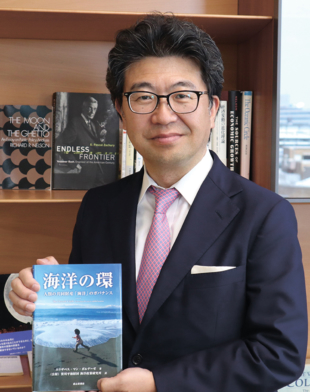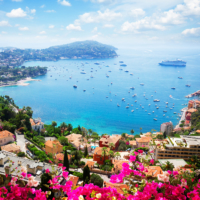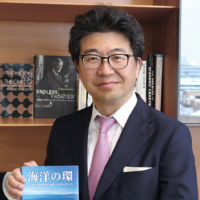The 2025 U.N. Ocean Conference, with the theme “Accelerating action and mobilizing all actors to conserve and sustainably use the ocean,” will take place from June 9 to 13 in Nice, France.
In a recent interview with The Japan Times, President Atsushi Sunami of the Sasakawa Peace Foundation (SPF), a private Japanese think tank and foundation, spoke about the significance of the conference, what Japan should communicate there and how SPF can contribute.

The U.N. Ocean Conference was launched in 2017 with the aim of supporting the implementation of the U.N.’s sustainable development goal 14, which aims to “conserve and sustainably use the oceans, seas and marine resources for sustainable development.”
Sunami said the importance of this conference, which is being held for the third time, lies in promoting discussion and action among countries on issues related to the ocean that are closely linked to climate change.
“The ocean, which covers approximately 70% of the Earth’s surface, plays a major role in climate-change mechanisms. However, climate-change countermeasures have primarily focused on land areas inhabited by humans, leaving discussions about the ocean less developed,” he said.
To address this, Sunami said, the conference will cover diverse topics including the promotion of the establishment of marine protected areas, the sustainable management of marine resources, the creation of an international agreement on plastic pollution and the promotion of marine science. He said Japan must take the lead in these discussions by demonstrating its commitment to environmental issues and leveraging its technology for global benefit, as well as fulfilling its responsibilities as a maritime nation that has long benefited from a free, open and healthy ocean and nurtured a rich ocean-based culture.
He further suggested that Japan should expand its efforts in showcasing innovative environmental technologies and sharing its experience with sustainable resource management methods that have allowed people to benefit from the ocean while preserving marine biodiversity. He also noted that Japan, with its long-standing fish-eating culture and as a major fish importer, is well-positioned to send a strong message against illegal fishing and to take a leading role in advancing “blue carbon” initiatives, which strategically utilize coastal and marine ecosystems’ carbon absorption abilities and other ecological and social benefits. “Across various regions in Japan, projects are underway to grow seaweed that not only absorbs carbon dioxide and serves as human food but also contributes to the recovery of marine resources by functioning as habitats for fish and providing benefits to the local community.”
“Ultimately, all of this relies on ocean science,” he said, explaining that any ocean-related measures and the promotion of the “blue economy” must be based on accurate analysis of the state of the ocean, an area where Japan can also take the initiative.
However, Sunami also noted that narrow national interests do not always align with what the world needs to do to protect the ocean, so there will inevitably be tension between nations.
“In the absence of a global government with sole authority to make and enforce decisions, individual countries serve as the highest level of decision-making units. Consequently, international agreements are only effective through the continued compliance of all participating countries,” he said.
He emphasized the need for non-state actors in overseeing and encouraging participating countries to ensure their compliance. “The U.N. also recognizes the importance of such non-state actors and grants special observer status to select organizations to participate as observers in U.N. conferences,” he said. “Holding this status, SPF needs to help create an environment where participating countries can engage in deeper discussions when [reaching] consensus is challenging, provide necessary knowledge and support multilateral processes based on the relationship of trust.”
Domestically, SPF works to communicate global viewpoints, including those of nongovernmental organizations that urge nations to adhere to international standards, to the Japanese government, aiming to align national and global benefits as best it can. “We cooperate with the government to integrate these voices into Japan’s policies and contribute to the international community,” he said.
In conclusion, Sunami expressed his sense of mission to help communicate Japan’s efforts and active engagement with ocean-related issues at the U.N. Ocean Conference in June.
Download the PDFs of this special





